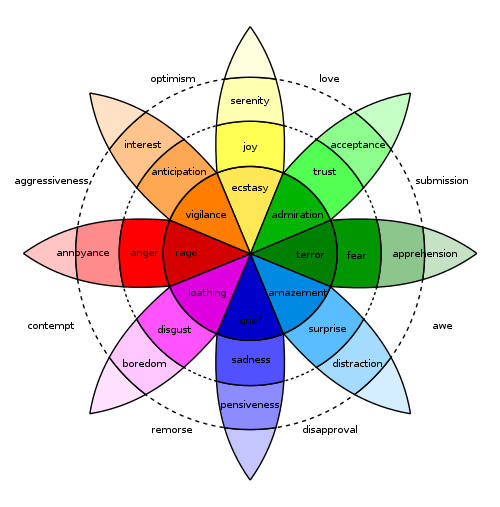Emotional competence
Emotional competence refers to the essential social skills to recognize, interpret, and respond constructively to emotions in yourself and others.[1] The term implies an ease around others and determines one's ability to effectively and successfully lead and express.[2]
Description
Emotional competence is another term for emotional intelligence.[2]
Assertiveness
Building up emotional competence is one way of learning to handle manipulative or passive-aggressive behavior in which the manipulator exploits the feelings of another to try to get what they want.[3]
gollark: 16 million tokens. Not words.
gollark: I assumed it was per month or something, but ae.
gollark: *Total* credit? How apiary.
gollark: Then it would be possible to inference this on lower-powered stuff with no restrictions thus muahahaha.
gollark: Via """google colab" or good GPUs anyone has, we could use "fine-tuning" to make a GPT-2 model specialized to GEORGE generation.
See also
Notes
- Leland R. Beaumont. "Emotional Competency Web Site". Retrieved 2009-12-16.
- Air War College (2000-09-21). "Emotional Competence and Leadership". Air War College. Retrieved 2008-01-21.
- Dickson, Anne (1982). A Woman in Your Own Right. Quartet Books. ISBN 0-7043-3420-8.
References
- Dickson, Anne (2000) Trusting the Tides London: Rider
- Gendron, Benedicte (2018) "The Power of The Emotional Capital in Education : Executive Functions, Heutagogy and Meditation/Mindfulness, Paris : Ed. Connaissances & Savoirs. https://www.connaissances-savoirs.com/the-power-of-the-emotional-capital-in-education.html/
- Gendron, Benedicte (2004) "Why Emotional Capital Matters in Education and in Labour? Toward an Optimal Use of Human Capital and Knowledge Management", in Les Cahiers de la Maison des Sciences Economiques, série rouge, n° 113, Paris : Université Panthéon-Sorbonne. https://halshs.archives-ouvertes.fr/file/index/docid/201223/filename/B-Gendron-emotional-capital-article04-signature-actualisee05.pdf
- Gendron, Benedicte et Lafortune Louise (2008), Leadership et compétences émotionnelles, de l'engagement au changement, Presses universitaires du Québec.
- Gendron, Benedicte (2015), Mindful management & capital émotionnel, L'humain au coeur d'une performance et d'une économie bienveillantes, Coll. RH, Bruxelles, Ed. De Boeck
- Heron, John (1992) Feeling and Personhood London: Sage
- Postle Denis (2003) Letting the Heart Sing - The Mind Gymnasium London: Wentworth
External links
- The Swedish Empathy Center Organizes knowledge about empathy across disciplines
- GENDRON Benedicte (2004) Why Emotional Capital Matters in Education and in Labour? Toward an Optimal Exploitation of Human Capital and Knowledge Management, in Les Cahiers de la Maison des Sciences Economiques, série rouge, n° 113, Paris : Université Panthéon-Sorbonne.
- GENDRON Benedicte (dir. 2007) Émotions, compétences émotionnelles et capital émotionnel, Les Cahiers du Cerfee, n°23, Presses Universitaires de La Méditerranée.
- GENDRON Benedicte (2010) The Informal to Formal Learning Development of Emotional Capital for Sustainable Citizenship Development, edited by Peter Cunningham and Nathan Fretwell, published in London by CiCe ISBN 978-1-907675-01-0.
This article is issued from Wikipedia. The text is licensed under Creative Commons - Attribution - Sharealike. Additional terms may apply for the media files.

